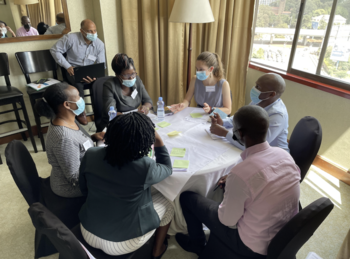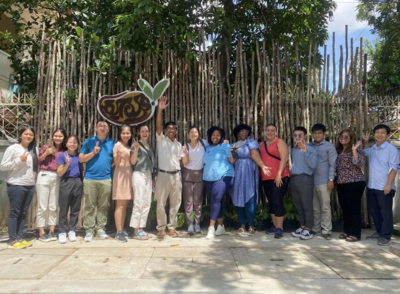I write to you from the Seattle airport on the final leg of my journey from Phnom Penh, Cambodia. I have been working alongside several Pulte colleagues and 3 global affairs graduate students in Kenya and Cambodia for the past 5 weeks to support the implementation of systems thinking workshops. The initiative will extend through the summer and into the fall across 12 countries in total. This number is quite hard to fathom (even for us staff!), but our team is dedicated to accomplishing this massive rollout because these meetings will serve as the foundation for our research on six critical education topics through the USAID-funded Supporting Holistic and Actionable Research in Education (SHARE) Program. A goal of SHARE is to support several of the USAID Center for Education learning agendas by conducting multi-country studies, on topics ranging from higher education financial sustainability to the book supply chain for primary-level schools.

The workshops, in a way, “kickstart” the research by allowing us to tailor each study to our countries’ contexts through consultation with key stakeholders. In return, we provide participants with the opportunity to begin to strengthen their own education systems by participating in a series of “systems thinking” exercises. These exercises aim to diagnose key issues in the system, causes and effects of those issues, and the ways that evidence is currently informing (or failing to inform) the system. We focus particularly on strengthening relevant actor’s ability to make evidence-based decision-making in the formation of education policies and programming.
It is not easy to conduct these workshops, especially not on this scale. The SHARE Pulte team has been planning for implementation for over a year, and our in-country research partners quickly jumped on board at the start of their contracts. This means that we have roughly 100 personnel around the world working to make these workshops a reality for some 350 participants in 12 countries in total. We have all learned how to be more flexible and open-minded, and - in the words of Dr. Roy from our partner Resilient Africa Network - we have learned how to “trust the process.” There has been constant iteration. Pulte staff and our partners alike have put in long nights to integrate invaluable inputs from participants so that our strategy can be more effective, more efficient, and more feasible for any location and context.

We do all this because we are driven by our commitment to producing quality products that generate the greatest impact possible – two core tenants of the Pulte Institute. Our team believes that such products are not possible if we do not engage critical end-users at the beginning of research, to ensure that results address the needs of each in-country context.
Moreover, we know that it is not enough to produce quality research and then walk away. We must fully reach into the system itself to help facilitate the movement of research from those who generate it to those who actually can use it. This is the vision of SHARE.
Even more, we have been able to connect and develop concrete relationships with our partners. We spent a Saturday in Kenya sharing nyama choma (roasted meat) with the University of Nairobi and swapping stories about our families and career goals. We boarded the “Titanic” with the Cambodian Development Resource Institute to celebrate the close of the workshop and talk about our reading groups, coffee preferences, and hobbies as we shared a meal next to the Mekong River (no sinking ship involved!). Across cultures and backgrounds, we shared stories, swapped photos, and made jokes.
These moments have been almost as important to me as the workshops, if not more. For me, such informal connections form the foundation of what it means to do international research collaboration and to do it well. Relationships that only focus on generating outputs so easily turn into contacts, not partnerships. The unfortunate reality of Zoom is that it has been difficult to move away from solely output-oriented relationships towards the larger, deeper connections of gathering in person as humans, not just as researchers. Thus, these small moments over the past five weeks of setting aside the workshop to learn about one another have been invaluable. I have walked away with not just a better understanding of our partners, but with several wonderful new friends. And so, I am exhausted, but excited for the continued unfolding of the workshop process. We still have much progress to make, many processes to adjust (or completely re-do), and new ideas to integrate. But it has been worth it. I can only imagine what the next three months will bring.